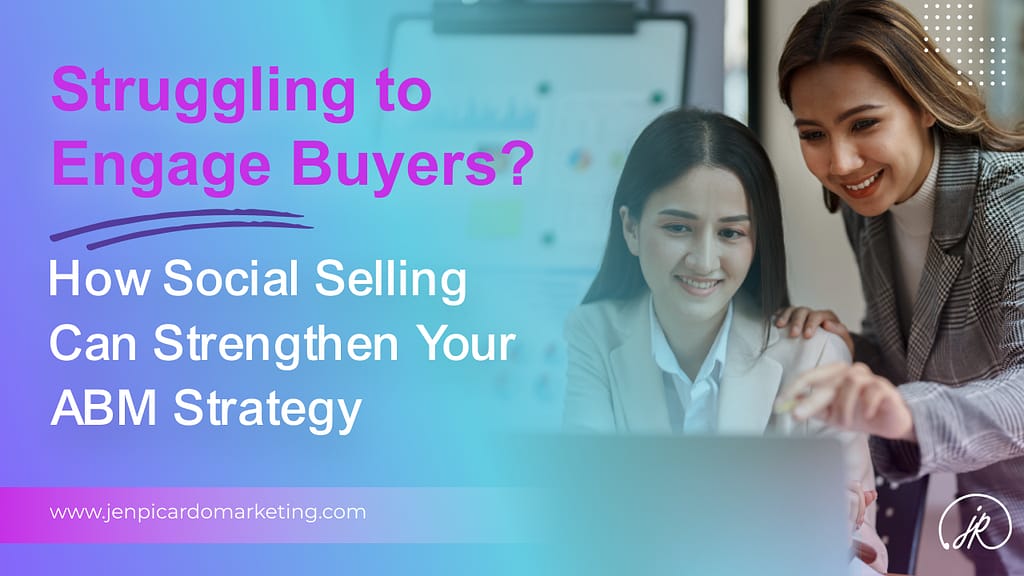What Is Social Selling—and How It Can Power Your ABM Strategy
Let’s clear the air: social selling isn’t just a buzzword—it’s a practical, proven way to build meaningful relationships with the right buyers.Yet, not many brands train their sales teams on how to do it well. Instead they’re handed quotas, tech stacks, and maybe a LinkedIn Sales Navigator license, with very little strategic guidance on how to engage digitally in a way that actually moves the needle.
That’s where marketing can step in—not just with assets, but with real partnership.

Why Social Selling Matters for ABM
ABM is about focus. Social selling is about finesse. Together? You’ve got a winning combo.
In account-based programs, where every touchpoint counts, sales reps need more than a target list—they need content, context, and cues for connection. Marketing can equip sales with the right tools and the right rhythm to build trust and drive momentum with key accounts.
But it doesn’t happen in a day—or with one connection request. Social selling is a layered process. And when it’s aligned to your ABM strategy, it becomes a competitive advantage.
The Four Stages of Social Selling (and How Marketing Can Support)
1. Listen / Monitor / Prep
This is where the groundwork gets laid. Reps are researching their target accounts, target prospects, monitoring activity, and looking for the right moment to engage.
What Sales Needs:
- Signals from intent data and firmographics
- Social listening dashboards (set up by marketing)
- Account research summaries
What Marketing Can Provide:
- Quick-hit intel sheets on top accounts
- Alerts on content views, ad engagement, or website visits
- Templates for research workflows
2. Engage
At this stage sales should follow each key account as well as potential prospects. Then reps can start to engage with content with likes, soft comments, or joining relevant conversations.
What Sales Needs:
- Credibility and visibility in front of target buyers
- Low-pressure ways to show up and add value
What Marketing Can Provide:
- Comment prompts or sample social responses
- A running list of relevant industry posts to engage with
- Thought leadership content reps can link to
3. Share
In the share stage sales should be actively sharing content with their network and tagging the right people to gain traction. This allows sales to start showing their own value and POV on their own posts or by sharing others.
What Sales Needs:
- Content that’s timely, insightful, and easy to personalize
- A reason to be in their buyer’s feed
What Marketing Can Provide:
- Social tiles and pre-written post copy
- ABM-aligned blog posts, videos, or reports
- Curated content packs for verticals or buyer stages
4. Connect
Once you’ve warmed up your prospect and made yourself visible, the final step is sending a connection request or direct message. And remember, there may be more than one entry point or target prospect at each account so it benefits you and increases your chances of connecting if you warm up multiple key targets at the account.
What Sales Needs:
- Confidence and context
- Messaging that feels relevant, not robotic
What Marketing Can Provide:
- Personalized DM or InMail templates
- Email follow-up sequences tied to shared content
- Executive-level outreach frameworks
Make Sales Enablement a Ritual, Not a One-Off
The best social selling strategies are not built for sales. They are built with sales. That means recurring check-ins where both teams:
- Share what’s working (and what’s not)
- Review top-performing posts and DMs
- Align outreach with campaign timing and messaging
This keeps everyone sharp and focused—and ensures your ABM motion doesn’t fall flat due to siloed execution.
Download the Social Selling for ABM Checklist
Want to make this real on your team? Start with our Social Selling for ABM Checklist, which covers:
- Daily habits (e.g., comment on 3 posts, check alerts)
- Weekly to-dos (e.g., share one resource, send 2 DMs)
- Monthly sync points with marketing